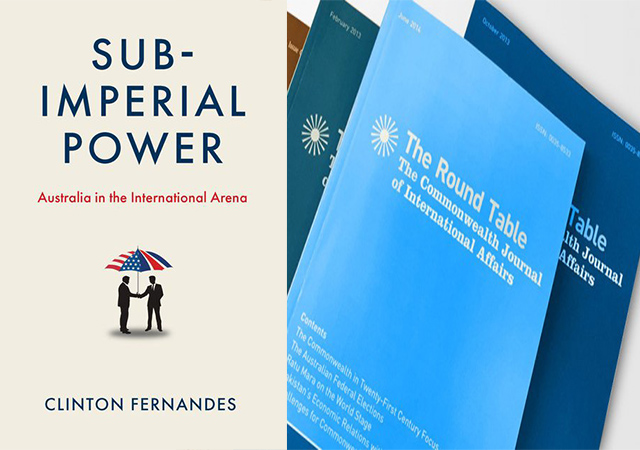
[This is an excerpt from an article in The Round Table: The Commonwealth Journal of International Affairs.]
This book offers an important perspective on Australia’s international role. It focuses on contemporary aspects but with due attention to the historical context. Clinton Fernandes argues that Australia acts in a subordinate role to an imperial power, the United States (US). He uses terms such as ‘empire’, ‘imperial’ and ‘subimperial’ in a ‘common sense’ way rather than delving into the extensive theorising relevant to these terms. For Fernandes the US is the world’s dominant power or hegemon, with Australia acting as a ‘junior partner’. In relation to the southwest Pacific and Timor-Leste, Australia is an imperial power in its own right. The rules-based order with which Australia identifies is primarily a US-based order dating from the years immediately after World War II; during the nineteenth and early 20th centuries Australia (or the Australian colonies in the former case) identified with the British-dominated international order.
While the overall argument is set out in the first two chapters, in subsequent chapters the author gives attention to more contemporary issues. Chapter 3 is on the AUKUS (Australia-United Kingdom-United States) partnership, dating from September 2021. There is an interesting angle in this chapter on how AUKUS fits in with Australian trade agreements with the US (2004) and the United Kingdom (2021). Chapter 4 is on China’s challenge to the US-dominated international order and how Australia has related to this polarisation. Chapter 5 focuses on themes of ‘expertise, secrecy and ideology’ as they relate to Australia’s international role. The conclusion is a brief argument in favour of a more egalitarian international order.
By Derek McDougall
Opinion – AUKUS: implications for Australia and other Commonwealth countries in the Indo-Pacific
Book Review – Tides that bind: Australia in the Pacific
Book Review: Australia and the World 1931-1936. Documents on Australian Foreign Policy
I am broadly in agreement with the book’s argument, particularly as it relates to ‘national security’ issues. The analysis of the economic dimensions of the key relationships expanded my understanding of Australia’s international role. I would see the interpretation offered in this book as adding a dimension but not to the exclusion of other perspectives. The approach of successive governments to national security issues has reduced Australian sovereignty, but Australia retains considerable agency on a range of issues. On trade issues, for example, consider Australia’s position on agricultural free trade (especially through the Cairns Group) or the tension between centre-right Coalition governments in Australia and various Democratic administrations in the US over climate change policy. Allowing for considerable debate about the concept, there is much to be said for the middle power approach in studying Australian engagement in these areas. On national security issues Australian governments in recent and more distant times have actively lobbied their senior partners to adopt more hawkish positions; the Vietnam war in the 1960s is a good example. Australia’s subordinate position does not necessarily imply ‘passive’.
Historically, the use of terms such as ‘imperial’ and ‘sub-imperial’ can be confusing given Australia’s role as a self-governing dominion within the British Empire from 1901 until at least 1942 (Australian ratification of the Statute of Westminster). The fact of this political and constitutional position does not negate the book’s argument, but I would make a distinction between Australia’s position in that context and what now prevails between Australia and the US. In the early decades of the 20th century Australia’s constitutional status reinforced its subordinate position, while Australia concurrently sought to influence the imperial centre and indeed saw itself as ‘punching above its weight’ because of its political location.
Derek McDougall is a Professorial Fellow at the School of Social and Political Sciences, University of Melbourne, Melbourne, Australia.



